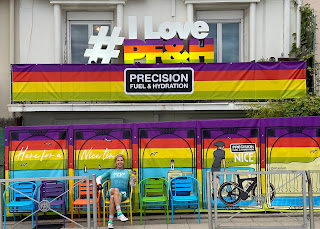The last time I ran was
on September 29—just an hour before I played Pickleball. That fateful event was more than just a game; it was when I raced the IMWC Nice with an already torn meniscus. Unfortunately, Pickleball was the proverbial straw that broke the camel's back, further damaging my knee.Now, fast forward to December 20, and I can confidently say that I have made significant progress. Reflecting on the past few weeks, I see a journey that included weeks without biking, swimming with a pull buoy, and pushing off the wall using just one leg. Today, I can bike at any intensity; my fitness level is the only limitation—my knee feels greatish! I can push off the walls and kick, and everything is in good shape. In fact, I’m lifting heavier weights than ever before, tackling squats, leg presses, deadlifts, and hamstring curls with weights that surpass my previous bests. However, the reality remains: I am still not running.I've been fortunate to work with a fantastic ART specialist who has provided invaluable guidance on my strength training. While I have made tremendous improvements, the question looms: what’s next? What does the path to running look like?Encouraged by several people, I visited Brad at Bespoke today. While it was disheartening to hear his assessment, he outlined a clear path to getting back to running. He detailed what I need to accomplish before I can lace up my running shoes again. The timeline is longer than I hoped, with a potential return to running in February. I nearly burst into tears at that moment—what came out was a simple, “Fuck.” I needed a moment to process, but Brad laid out a sensible progression plan.I’ve had to reset my expectations. Celtman is likely off the table, and I’m now aiming for the Olympic at Wildflower vs the Double, some gravel events. It sucks—like, really sucks—but I understand what needs to be done. I must follow the plan and work toward running. The first half of 2025 will be dedicated to returning to my running form, and then I’ll reassess for the second half of the year.When Brad asked how I felt about it, I told him it felt like a punch to the stomach. I just need time to accept this new reality, reassess my goals, and embrace the joy of biking again. Focus on what I can do! Be grateful for the rest of my health; I realize this is a first-world problem.Looking forward to Gravel and Wine; going to add BWR and a few more events... Merry F’ing Christmas!










